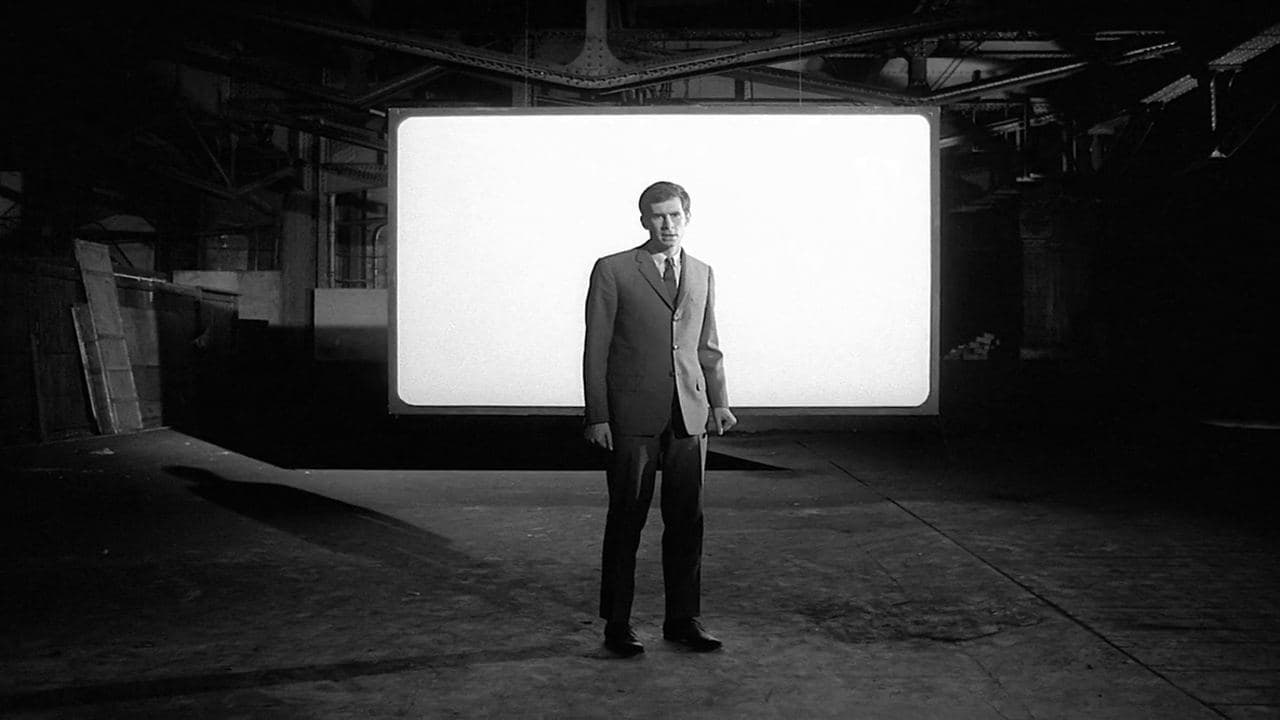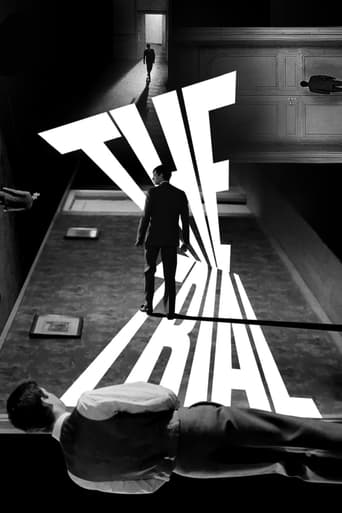Develiker
terrible... so disappointed.
Matialth
Good concept, poorly executed.
Afouotos
Although it has its amusing moments, in eneral the plot does not convince.
filippaberry84
I think this is a new genre that they're all sort of working their way through it and haven't got all the kinks worked out yet but it's a genre that works for me.
Rainey Dawn
One of the most artfully filmed movies - very much surreal. This is also one the best films roles for Anthony Perkins, he's perfectly and rightfully cast.Imagine waking up and the police are in your room, you are told you are under arrest - but not in the traditional sense of the words "under arrest". Imagine you are made to stand trial for and never knowing what the charges are against you. You have to defend yourself without knowing what you are defending yourself against. This has happened to Josef K. (Perkins) in this dramatically bizarre, twisted mystery-thriller.9/10
souplipton
The Trial is Orson Welles' attempt to adapt Franz Kafka's tale to the silver screen, and the success of that adaptation is an interesting case. The film's visual style and atmosphere are impeccable, but its plot seems to be tenuously put together. This is not surprising, as the source material was never completed by Kafka, and was never intended to be published. The book was assembled after his death by his executor out of the unordered (and sometimes unfinished) chapters which Kakfa had written. The adaptation deals with this by playing the tale as very surreal, which is brought out most excellently by the sets. Welles used an abandoned train station to construct his giant spacious sets, which evoke strange responses with their industrial decay, open work places of endless repetition, and claustrophobia. All the settings are strange and off-putting in the best of ways. The cinematography too is incredible, with exaggerated and unrealistic lighting picked up by the canted and unusual angles to create an unsettling effect. The cast also works wonderfully, as Perkins gives one of his best performances as the protagonist Joseph K. The filmic aspects of the work are all wonderfully executed, but the film doesn't quite pull it off. This is due to the problems with adapting a work which was itself unfinished. However, this shortcoming can be overlooked, as this is one of Welles' best works, a daring work of cinema to be enjoyed and appreciated.
SnoopyStyle
Josef K (Anthony Perkins) wakes up one morning and finds the police in his room. They question him as people from the office searches through his stuff. The proper but unhelpful police won't tell him anything about his case. Everything he says is taken out of context. Eventually there is a trial where nothing is truly explained.Director Orson Welles is putting some of his skills into bringing this Franz Kafka tale onto the big screen. It's a stripped down narrative with some very long stationary uncut scenes and some wildly unconventional visuals. The elderly neighbor Burstner tells him that he's being investigated for something very abstract. That's how the whole movie feels. It's very abstract. It's very strange. It's very artsy. The dubbing also lends a very surreal feel. It makes for a very odd viewing experience and not a particularly compelling one. Anthony Perkins shows his vast acting skills, but this is no popcorn movie. The copy I saw wasn't terribly sharp. It's definitely not for the casual movie goer.
kurosawakira
Welles was able to finish to his liking only eight projects, of which this is one. Others were taken away from him, most of them butchered by the studio and producers. That's only eight films during a period of 37 years. All of this because of one citizen Kane.It's a real tragedy that Welles would be unable to finish most of the things he worked on after this, the two sweet expectations being "Chimest at Midnight (1965) and "F for Fake" (1973), the latter which I think is his best film (whatever that means). No wonder then that Welles found such a resounding autobiographical level in this, and in retrospect considered it to be his best film.I'm not at all into reading too much into the lives of filmmakers as some kind of key to understanding and enjoying their work, but this case is different. Keeping in mind that here we have a self-confessed best film of a genius whose art was largely taken away from him, the final image of the huge open doors, Welles narrating the credits and saying "I'm Orson Welles" is as scintillating a moment one can get. The simplest of moments, but full of such release, dreaming and justice, such final resolve that it's overpowering.A refined work of dazzling visual mastery, assured and lucid. Welles is a revolutionary, not only a master of the eye, what we see, but also a master of editing. He's so radically different from anything I've ever seen that not even Wong, the modern maven, quite compares.And remember what money this has been made with! The space, basically that empty building, exhaustively utilized. Everything works, since all is out of joint, Perkins embodying this feeling of disconnect, stuttering around with strange confidence, emphasizing Kafka's bleakly hilarious and oppressively suffocating atmosphere that only he can paint.A puzzle, sure; a labyrinth, most certainly.

